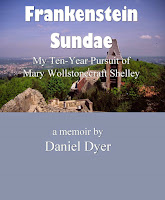I have no
wish to pound into the ground this point about Mary’s self-references in the numerous
encyclopedia entries she wrote in the mid-1830s. Just a few more …
In the first
volume of her French Lives—a project
by the way that mentions few women—she does have an entry on Madame De Sévigné (1626–1696). We could not, writes Mary, omit a name so highly honourable to her
country … whose genius has adorned the world.[1]
And a few pages later, Mary comments about her subject’s widowhood, comments
that clearly relate to Mary’s experience, as well. Left at four-and-twenty without her husband’s protection, in the midst
of a society loosened from all moral restrictions, in which the highest were
the most libertine, no evil breath ever tainted her fair name.[2]
Mary—widowed
also at four-and-twenty—did not, of course, enjoy any of this freedom from
censure. Not only did she suffer throughout the remainder of her life from the
taint of her elopement with a married man in 1814, but she also endured bitter
words about the behavior of her parents—William Godwin and Mary
Wollstonecraft—for their
unconventional (and therefore immoral and shameful!) behavior.
At the end
of her entry, Mary—thinking of herself?—says It is strange how people can find dark spots in the sun ….[3]
In the second
volume of French Lives, writing of Rousseau
(1812–1778), Mary comments further on what she calls women’s virtue: It is not
today that we have learnt, that it is not true, that when a woman loses one
virtue she loses all. The true distinctive virtue of woman’s nature is her
promptitude of self-sacrifice and a capacity to bind up her existence in the
happiness and well-being of the objects of her attachment.[4]
Surely, she was thinking: This is what I
want you to think of me!
Finally … in
her entry on Madame de Stael (1766–1817) she alludes to de Stael’s fondness for
Lord Byron in Geneva in the summer of 1816. The summer Bysshe and Mary were
there. The famous Frankenstein Summer
when she wrote the story that became the novel that has overwhelmed the world.[5]
She does not mention herself in this passage, but she does add, a page or so
later, what could be a sub-theme of all of her entries: Such is the defect of human nature that we have no right to demand
perfection from any individual of the species.[6]
She could
just as well have said, “Forgive me. I have, after all, forgiven myself.


No comments:
Post a Comment